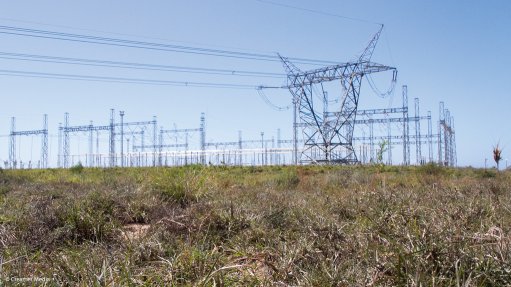
Photo by: Creamer Media
A new benchmarking assessment of South Africa’s electricity grid access queueing mechanisms indicates that Eskom’s systems are slower and less transparent than those being implemented in developed and developing countries analysed as part of the study.
Published by the RES4Africa Foundation, the report includes case studies of the grid management frameworks being implemented in Brazil, Chile, Italy and by PJM Interconnection in the US.
These systems have been assessed against five key performance indicators, namely: grid connection timeframes, the cost of connection, regulatory requirements, queue management, and transparency.
South Africa’s framework is in flux and is being governed currently by Interim Grid Capacity Allocation Rules (IGCAR).
These were introduced following the failure of the sixth public renewables round when none of the wind projects vying for a 3 200 MW allocation were selected because the capacity on which the projects were based had been absorbed by independent power producers being pursued on the back of private power purchase agreements.
Eskom argued that the new rules would prevent so-called grid hogging as they were based on prioritising shovel-ready projects rather than processing applications on a ‘first come, first served’ basis.
Separately, Eskom has also applied to the National Energy Regulator of South Africa (Nersa) for permission to preserve/reserve grid capacity for the public Renewable Energy Independent Power Producer Procurement Programme (REIPPPP) rounds so as to prevent any repeat of the failure of bid window six (BW6).
As a consequence, the bid submission deadline for BW7 was recently postponed to August 15 from May 30, a deadline that had itself been extended from the initial submission date of April 30.
RES4Africa Foundation Southern Africa project officer Mohau Nei reports that the IGCAR and Eskom’s proposed Gated Generator Connection Process, which still requires Nersa approval, were also tested against the five performance indicators.
When benchmarked, the selected countries and South Africa all had strengths and weaknesses, but South Africa lagged on grid connection time, regulatory requirements, queue management, as well as communication and transparency.
The study recommends that South Africa ratifies its rules as soon as possible to provide investors with predictability.
It also recommends that best practices be integrated, including through creating online systems for grid applications and to provide real-time visibility of queuing progress.
Nei adds that the study’s outcomes also point to the desirability of migrating to a clustered assessment methodology rather than case-by-case approvals so as to enable an analysis of the whole cluster’s impact on the grid.
This, she says, will facilitate equal access between REIPPPP projects and private projects as well as enable Eskom to revoke capacity allocated to projects that are failing to advance to construction.